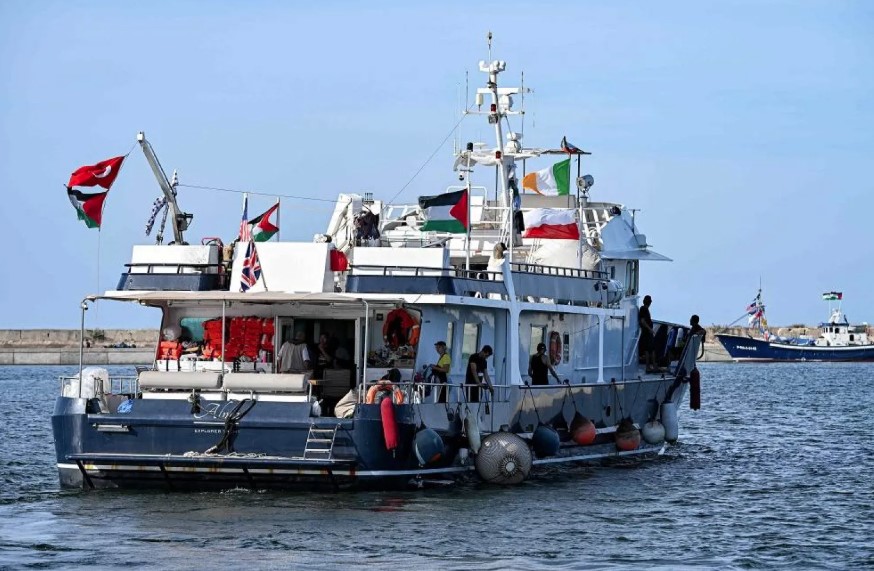The Italian government deployed a naval vessel to assist the Global Sumud Flotilla after several drones attacked it in the Mediterranean Sea. The flotilla, carrying vital humanitarian aid for the people of Gaza, faced the attack early Wednesday, roughly 600 nautical miles from the enclave.
Italy Sends Naval Ship to Protect Flotilla Under Attack
According to the flotilla organizers, a swarm of 15 drones launched the attack, causing explosions and significant damage to several boats. Flash-bang grenades struck at least six of the vessels, and one boat was hit by what was described as an “unidentified chemical device,” which later fell into the water. One participant sustained injuries, and two of the flotilla’s boats were damaged.
Italy’s defense authorities responded promptly. The defense ministry strongly condemned the attacks and confirmed that Italian citizens were among the flotilla participants. To ensure their safety, the Italian Navy dispatched the multi-purpose frigate Fasan, already en route for potential rescue operations. Officials stated that this move represents one of Italy’s most direct interventions to protect civilians in international waters in recent years.
🇮🇹 Meloni defies France’s push for Palestine recognition — Italy doubles down on Gaza aid
The flotilla organizers highlighted the urgency of the situation, emphasizing that their mission is purely humanitarian. They stressed that the attack put innocent lives at risk and called for immediate international attention to prevent further incidents at sea.
Global Solidarity and Calls to Protect the Flotilla
The attack on the Sumud Flotilla has triggered strong reactions across Europe. Labor unions in Italy organized a nationwide strike in solidarity with Gaza, with hundreds of thousands of people participating in rallies across more than 75 cities and towns. Protesters voiced support for the flotilla’s humanitarian mission and called for immediate aid delivery to civilians in need.
European Union representatives and other officials urged governments to ensure protection for the flotilla. The organizers emphasized that their mission is non-violent and includes roughly 350 participants—humanitarians, doctors, journalists, lawyers, and volunteers from more than 40 countries. The flotilla is carrying approximately 250 tons of food and medical supplies intended for civilians suffering under the ongoing blockade.
Italy Slams the Brakes on Starlink Deal with Musk Over Security Fears
Despite warnings from Israeli authorities, the flotilla has insisted on continuing its peaceful mission. Organizers have called on UN member states, particularly those with citizens aboard, to provide protection through maritime escorts, accredited diplomatic observers, and an overt state presence. They emphasized that all measures should remain protective and facilitative, consistent with the flotilla’s humanitarian purpose and international law.
The flotilla organizers noted that international cooperation is essential to safeguard their mission and allow aid to reach those in critical need. The strong support across Europe has amplified calls for the safe passage of the flotilla and for attention to the humanitarian situation in Gaza.
Aid Blockade and Humanitarian Crisis in Gaza
The Sumud Flotilla has brought renewed attention to the severe humanitarian crisis in Gaza, where the blockade has limited the delivery of essential food, water, and medical supplies. Israel has demanded that aid be handed over for distribution under its supervision, but the flotilla’s organizers refused, arguing that prior restrictions have prevented sufficient relief from reaching civilians.
Human rights organizations have condemned the attacks on the flotilla and criticized threatening statements made against its participants. Amnesty International emphasized that states have a responsibility to ensure the safe passage of the flotilla, particularly because repeated efforts to pressure Israel to allow humanitarian access have largely failed.
Italy-Greece Warship Pact Ignites Heated Debate Over Bergamini Frigate Acquisition
The flotilla’s mission actively provides direct assistance to civilians and draws attention to the ongoing blockade. Recent reports show that thousands of civilians have died or sustained injuries in Gaza as a result of ongoing conflict and the restricted access to essential aid. The flotilla, carrying doctors, humanitarian workers, and volunteers, is attempting to bridge the gap in emergency relief while highlighting the urgent needs of the population.
The attacks on the flotilla have drawn global attention to both the blockade and the risks faced by those delivering aid. Organizers have reiterated their commitment to a non-violent mission and the importance of international protection for their humanitarian work.

